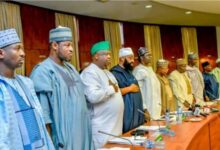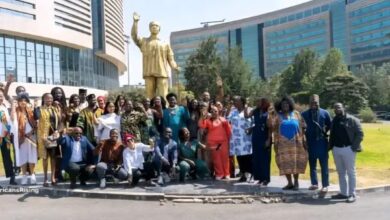NEWS ANALYSIS: Nigeria Air: Avoiding the pitfalls of Nigeria Airways
 One of the concerns of President Muhammadu Buhari from the inception of his administration includes inquiries on the resting of the national carrier — Nigeria Airways Ltd. — and the process of reviving the once vibrant Nigerian airline.
One of the concerns of President Muhammadu Buhari from the inception of his administration includes inquiries on the resting of the national carrier — Nigeria Airways Ltd. — and the process of reviving the once vibrant Nigerian airline.
For the benefits of the hindsight, Nigeria Airways was vibrant in the 1980s with its fleet comprising more than 30 aircraft before it was rested in 2003.
With a promising future for the airline then, the federal government moved from owning 51 per cent shareholding of the airline to 100 per cent shareholding in1961 to make the airline the country’s flag carrier, serving both domestic and international destinations.
However, Nigeria Airways Ltd. ceased operations in 2003 with a huge debt of more than 700 million dollars, the development that has been given both stakeholders and government serious concern.
Concerned citizens have then been asking: What are the pitfalls in the management of the airline and what to do to avoid recurrence in the event of engaging similar venture.
Some experts in aviation industry observe that improper management, ranging from corruption to overstaffing, brought down the airline.
 Former Flight Captain with Nigeria Airways Wale Otubanjo, who was a staff of Nigeria Airways from 1980-2003 before voluntary retirement, notes that the pitfall of the airline is mainly mismanagement.
Former Flight Captain with Nigeria Airways Wale Otubanjo, who was a staff of Nigeria Airways from 1980-2003 before voluntary retirement, notes that the pitfall of the airline is mainly mismanagement.
“If anyone leases an aircraft on wet lease agreement such one will never ever make money.This has led to downfall of so many operators in the country including Nigeria Airways.
“In a wet lease situation, the lessor is providing both aircraft and crew, the lessor maintains operational control of all flights.
“But in a dry lease situation, the lessee provides its own crew and the lessee exercises operational control of its flights,’’ he explains.
He says Nigeria Airways with its network points in Europe, North America and Saudi Arabia, was managed by a number of foreign companies, including British Airways, KLM and South African Airways on “wet’’ lease.
Otubanjo observes further that the airline operated a variety of aircraft such Vickers VC10, Airbus A310, Boeing 737 and 747 and McDonnell Douglas DC-10 by owing or leasing.
Similarly, retired Group Capt. John Ojikutu, a formal Commandant of the Murtala Muhammad Airport, Lagos, alleges that government officials and those in the management of the Nigeria Airways are responsible of resting the airline.
Ojikutu observes that the loss by the airline started from the attitude of the government officials by using air warrants to board flights without return payments.
“Later, government officials collected fares from sources for first and business classes and by some arrangements, economic tickets were issued but they would still be offered first or business class seats.
“There were many similar frauds that included both government and management of the airline which led to huge losses of government investment, huge losses of revenue and huge debts for the airline.
“Not many national governments are investing in commercial aviation today without substantial investments from credible investors and technical partners,’’ he observes further.
According to him, no U.S. airline today is a national carrier rather they are all flag carriers with investments from the nationals but not government.
Ojikutu advises the federal government to ensure that proper steps are taken before undertaking new national carrier project.
He further advises the government to carefully consider effective suggestions from aviation experts to have a virile national carrier.
“On Nigeria Air, the suggestion to the Ministry of Aviation in 2019 which was approved was 35 per cent for foreign technical partners, 40 per cent for investors and 25 per cent for credible Nigerian investors.
“Others included 25 per cent for the Nigerian public and 10 per cent for the federal government and the 36 states.
“These were supported by the minister of Aviation in August 2019 but the genuineness sharing formula was dropped to five per cent for whatever reason. Since 2019, it has been one step forward and five steps backwards,’’ Ojikutu explains.
Ojikutu recalls that N19.5 billion intervention funds have come in different forms, showing the readiness of the government to make the airline work.
Worried by the pitfalls of the Nigeria Airways, President Muhammadu Buhari has said that the establishment of Nigeria Air would be by the Public Private Partnership.
Nigeria Air was unveiled at the Farnborough Air Show in England on July 18, 2018 and the proposed airline was expected to cost 8.8 million dollars as preliminary cost and 300 million dollars as take-off cost.
Minister of Aviation Hadi Sirika said at the Federal Executive Council meeting that the federal government had approved the leasing of three aircraft for the commencement of operations of the Nigeria Air.
Sirika noted that the airline would begin with three aircraft made by Airbus and Boeing, running solely domestic routes.
The minister stated that the airline, which operations would be announced soonest, would expand into regional and intercontinental routes.
He said the whole process for the establishment of the national carrier and all the projects under the government’s aviation roadmap had been guided by the principles of transparency and accountability.
Further to this, Capt. Musa Nuhu, the Director-General, Nigerian Civil Aviation Authority (NCAA), has presented an Air Transport License (ATL) to the interim management of Nigeria Air.
Nuhu said that ATL was a prerequisite for the airline to acquire Air Operation Certificate (AOC) to start operating.
According to him, the NCAA works and supports all operators currently existing and aspiring in the industry to get necessary documents after meeting all the requirements.
“This ATL has gone through all the processes. So, at this point in time, I would like to do the presentation. We look forward to the fulfilment of the AOC process so that we can hand over the AOC certificate to you.
“As the regulator, we work with operators. That is a goal to promote the growth of the industry. It is important to have strong airlines in Nigeria in view of the Single African Transport Market,’’ he said.
Nuhu said that Nigeria stood to get the best from the African Union Agenda 2063 Air programme, being one of the largest markets in Africa.
He said that participating in Single Africa Air Transport Market as a nation would increase the Gross Domestic Product.
The Acting Chief Executive Nigeria Air, Mr Dapo Olumide, thanked the NCAA for the good job executed leading to the presentation of ATL to Nigeria Air.
Olumide said that the team would definitely double efforts to fulfil all necessary processes to receive AOC certificate from NCAA to start flying.
READ ALSO:https://brandeconomy.com.ng/eu-pledges-stronger-support-for-nigerias-reform/
“We already have aircraft identified because that is one of the requirements for the NCAA. We are waiting for the terms of agreement with the Provider of Original Equipment Manufacturer (OEM).
“What we need now is to go through stages to get an AOC certificate from the NCAA. No magic in the process. It is not something that can be issued because they like your face.
“When you have an AOC and ATL, you can commence commercial scheduled operations. The date to start operation is largely based on the process one is following to get the AOC certificate,’’ he said.
According to him, 49 per cent of the Nigeria Air project will be owned by equity partners and 46 per cent by Nigerians while the federal government will own five per cent of the shares.
“The ATL certificate signed by Director-General of the NCAA Musa Nuhu will run for a period of five years (from June 3 to June 2, 2027).
“It is one of the certifications that must be acquired by airlines before they can commence operation while they await all-important Air Operator Certificate (AOC).
“This will fully guarantee Nigeria Air the right to begin air services,’’ he said.
CREDITED: Gabriel Agbeja, News Agency of Nigeria (NAN)











